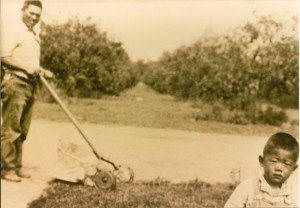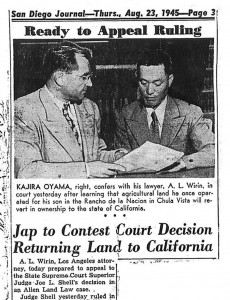In Oyama v. California, the United States Supreme Court, in a landmark ruling, decided that the California Alien Land Act violated Kajiro and Fred Oyama's constitutional rights.
The Alien Land laws, passed in California in 1913 and 1920, said that "persons ineligible to become citizens of the United States" were prohibited from owning land. Under the laws of the time, "ineligible persons" meant everyone except whites and African Americans.
With the U.S.'s entry into World War II, racial tensions skyrocketed, and anti-Japanese sentiments grew strong. The infamous internment of 120,000 Japanese immigrants and Japanese-Americans began, and California reinstituted prosecutions under its Alien Land laws.
Kajiro Oyama, a Japanese immigrant to the U.S., was one of the individuals targeted.
Oyama had purchased six acres of land in Chula Vista, California in 1934 for $4,000 to grow celery, tomatoes and peppers. The land was deeded to Kajiro Oyama's U.S. citizen son, Fred. In 1942, the Oyama family was ordered to leave the West Coast, as were all other Japanese immigrants and Japanese Americans in the area. The Oyamas went to Utah. In 1944, when Fred was 16 years old and still forbidden to return to his home, California filed a petition to declare the Oyama land was forfeited to the possession of the state, because the purchases had been made with intent to evade the Alien Land Act.
Legendary ACLU attorney A.L. Wirin took Oyama's case, but lost in the lower courts. In its ruling, the California Supreme Court, which upheld the trial court's findings, said that since the state was permitted to exclude ineligible aliens from purchasing, transferring, and owning agricultural land, Fred Oyama had not suffered deprivation of any constitutional guarantees.
The ACLU took the case to the United States Supreme Court, where Dean Acheson, the Secretary of State under President Harry Truman, presented the case for the Oyamas.
The case listed three charges against the Alien Land Law as it was applied in the Oyama case:
1. It deprived Fred Oyama of the equal protection of the laws and of his privileges as an American citizen;
2. It denied Kajiro Oyama equal protection of the laws;
3. It violated the due process clause by sanctioning a taking of property after an appropriate period of limitation had expired.
The Supreme Court agreed by a vote of 8 to 1 with the ACLU's contention that Fred Oyama had been deprived of federal and state equal protection guarantees. Since this decision alone was grounds for reversing the California Supreme Court decision, the Court did not address the other two contentions.
Though Oyama did not strike down California's Alien Land Laws, it did prove to be an important precedent, when the case was cited in Sei Fujii v. California, and then finally repealed in 1956.
Significance of Oyama
A.L. Wirin said that the Oyama [and Takahashi] cases were the most important he had ever handled "because they were able to establish principles which were the forerunners of the U.S. Supreme Court cases involving Negroes and affording them the rights to equal treatment and equal protection under the law."



